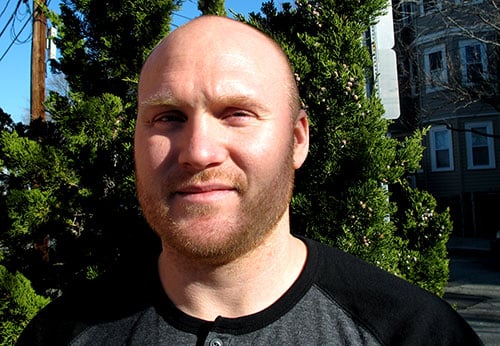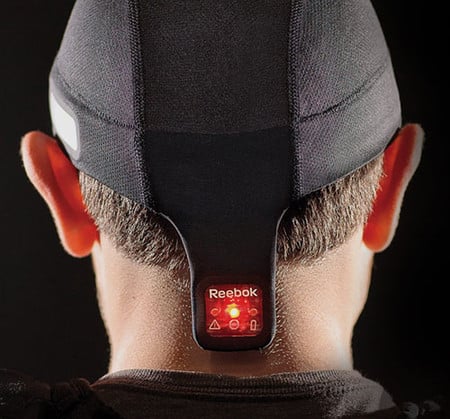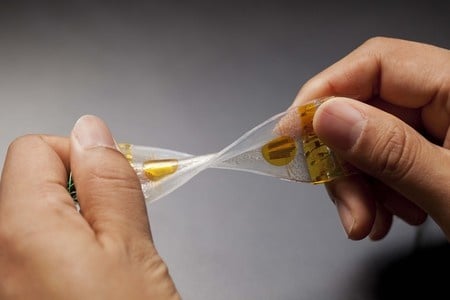From Harvard + the NFL to Wearable Tech, Isaiah Kacyvenski Knows Sports Management

We'd like to introduce you to Isaiah Kacyvenski, Harvard graduate, former NFL football player, wearable tech innovator at MC10, and champion for player health and well-being both on and off the field. This summer, Isaiah will be working with our EXPLO Sports Management students. We're excited to have him on board.
From the NFL to MC10
Isaiah Kacyvenski is not your typical former professional athlete. After four years playing (as an undergrad) for Harvard University's football team, and seven years playing professionally for the NFL — a lifelong dream made real — Kacyvenski followed a passion for innovation, entrepreneurship, and creative thinking to a position at MC10, one of the country's leading conformable electronics companies.
During his eight seasons in the NFL — playing for the Seattle Seahawks, the St. Louis Rams, and the Oakland Raiders — Kacyvenski suffered seven concussions, along with a whole host of other injuries (and subsequent surgeries):
"I've had ten surgeries on my body," Kacyvenski says, "so I know how to come back from injury well. Well, not 'well,' I guess, but being able to come back and understand how you manage pain and how injuries can lead to other injuries in this cascade effect. So I wanted to figure out, how do I use this [knowledge]. At MC10, I've been able to put all of that into play."

Get to Know MC10
MC10 is an electronics company with a vision. Their goal (to quote their website) is, "To redefine the interface between electronics and the human body. In other words – make humans more superhuman." They do this by working to make the connection between humans and the electronics they use — to measure health, well-being, and safety from sports fields to battlefields — as seamless and second-nature as possible. Visit their website to find out more about what they do.

The CHECKLIGHT + Biostamp
When Kacyvenski came on board at MC10, the team had recently begun work on what would later become the Reebok CHECKLIGHT, a helmet-like device that accurately measures force of impact to the head. It's a device that functions much like a skullcap, and can be worn with or without a helmet.
"The CHECKLIGHT has been really impactful," Kacyvenski says. "We launched over a year and a half ago in football, lacrosse, ice hockey, skiing, boxing, mixed martial arts, rugby, basketball… There's a large range of sports where it could have an impact. I will say that on some level, I want to accelerate the adoption curve, but one of the things we've learned is that people play their sport one way, and introducing electronics into it is something different. There's been an interesting learning curve, but awareness around this issue is not going away. I'm proud of the fact that MC10 and Reebok were able to have enough foresight to see that this could be a really important data collection tool."
Performance Data Calculated Effortlessly
Using wearable tech, such as the CHECKLIGHT and MC10's latest innovation, the Biostamp — a "location-agnostic" stretched circuit that will let you "think about capturing data for longer periods of time, and honestly forget you even have it on" — required MC10 to “literally rewrite the design rules from conventional electronics." Among the host of objective measures MC10's technology seamlessly collects are force of impact, muscle activity, heart rate, and velocity of movement.
"It is truly amazing," Kacyvenski says. "It would be taking the guesswork out of how you train and how you prepare, and that resonates for me."
Below, an example of one of MC10's stretched circuits:

Working with Wearable Tech
Kacyvenski runs the consumer applications side for MC10's flexible electronics platform, so to help both test the products and understand how best to implement them, Kacyvenski created MC10's Sports Advisory Board, which counts Andrew Luck, Grant Hill, Matt Hasselback, and Kristine Lilly among its members. This impressive cadre of athletes are notably visible early adopters, but also provide genuine feedback.
"We have this flexible, innovative platform, with stretchable electronics," Kacyvenski says. "If you could put the electronics anywhere, what would you do with them? I can draw on my own experiences, but I also need the input of a lot of different people. So we decided to put together this Sports Advisory Board, not to use them as a marketing machine, but use them for their minds and their experience. If you look at the individuals on the board, they all have this common denominator. They're each passionate about their sport, treat their bodies as temples, are really prepared, and spend a lot of time thinking about this. They're all very smart people."
Creating the board also gave Kacyvenski insight into how to put together and manage such a collaborative roster of individuals. "Putting the board together and negotiating every single contract was and is an amazing process," Kacyvenski says, "as well as being there to manage them as we move forward."
The Beginnings: How to go from Pre-Med to a Startup
After finishing his MBA at Harvard Business School (HBS), Kacyvenski chose to work at MC10 because it would be the perfect platform to marry his desire to promote health and well-being with a growing love of business and innovation. "If I didn't make it to the NFL," Kacyvenski says, his original plan was to become a doctor. He was on the pre-med track as an undergrad at Harvard, but found himself more drawn to the world of finance and business because, as he puts it, "For the first time in my life, I had money, but I also realized that I better learn how to manage it."
So Kacyvenski went from hiring a financial advisor, who became both a teacher and "a sounding board," to taking an introductory entrepreneurial program while still with the NFL, to enrolling in HBS. And after trying out the corporate world, Kacyvenski embraced "this idea of innovation and thinking creatively" — an idea he's made real at MC10 — and hasn't looked back since.
Building a Brand, Innovating an Industry
"Every day," Kacyvenski says, "I'm in touch with the biggest brands in the world to think about how we can innovate. And each brand, from sports brands to consumer brands, wants to innovate in their own way."
Over the last four years, companies have shifted from funneling money into their in-house R&D departments, to seeing which companies and innovative products on the outside might better align with where these companies want to position themselves in the market. It happened with Reebok and the CHECKLIGHT, and if companies continue to embrace this approach and "leverage that outside talent," Kacyvenski says, it could make the whole industry much more efficient.
But even for those within the companies at the forefront of innovation, there is still a giant learning curve. When Kacyvenski came on board, he says, "I understood the psychology and the mentality of the player, not only in football but across sports, and understood how to develop this project, how to test it, and how to work with the very talented team that was in place."
Lessons in Sports Management: Do You *Need* an Agent?
For a period of time while playing in the NFL, Isaiah Kacyvenski acted as his own agent. He thought that he would be acting in his best interests, but as he soon realized, "agents really filter out a lot of information before it ever reaches the players."
"The teams are brutally honest," Kacyvenski says. "If you want to be the big boy and step up and be your own agent, you're going to have to hear why we're not going to pay you this much, that your potential will only reach here and we don’t ever see you reaching there… Confidence is a really key piece to being a player, so I needed to step away from that aspect of it. I learned a lot through the process, and it gave me a lot of insight into what actually goes on behind management doors."
The Future of Sports Management, the Future of Data
For Kacyvenski, the future of sports management and the future of data are one and the same. In other words, you’d be hard pressed to find one without the other.
"From my perspective," Kacyvenski says, "if you think about wearable tech and measuring performance, you can start to see that’s where it’s going. You know, the idea of the GM at the top saying, 'I'm not going to do that fancy-schmancy stuff,' that's going to die. But I always like to temper it and say, the idea of making decisions purely on data is a really bad idea. In the end, you have to get a sense of when you put a team together, how they work together. There’s always a human element."
But, Kacyvenski says, "For me, I always tell people that the one thing that got me from the streets, from poverty, to Harvard, and to the NFL is my heart — and that's something you can't measure. Being proficient on using data as an added input is going to be absolutely key. It's going to play a larger and larger role, depending on what you're looking at, but I think the world of sports management is going to shift in a pretty big way."


